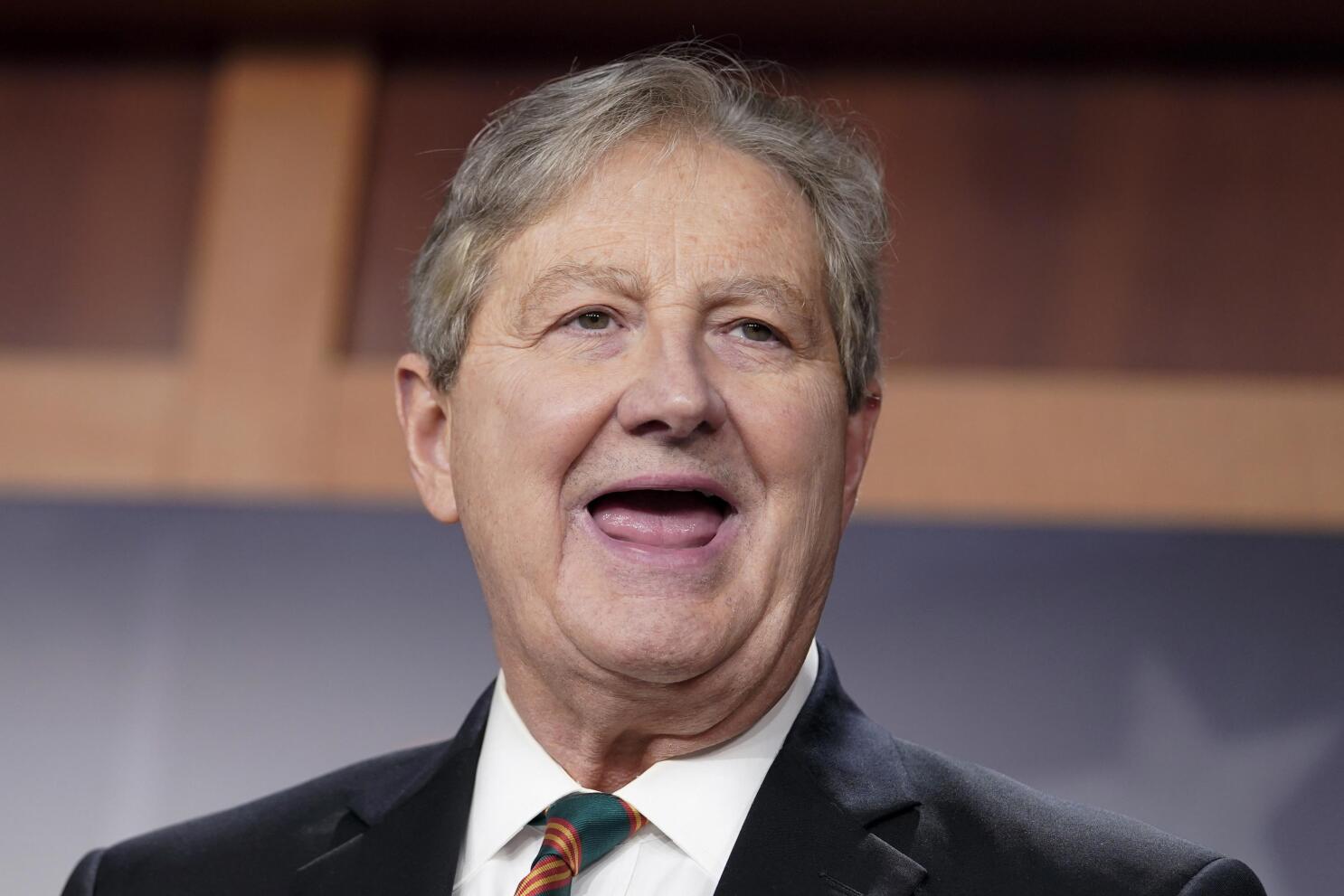Nancy Pelosi’s Epic Showdown with Senator John Kennedy: A Political Reckoning
On September 15, 2024, a routine congressional hearing took a dramatic turn, marking a pivotal moment in American politics. Speaker Emerita Nancy Pelosi walked into what she believed would be a standard discussion on congressional ethics and accountability, unaware that Senator John Kennedy had meticulously prepared for a political confrontation that would expose her vulnerabilities and potentially end her career.

Setting the Stage for Confrontation
As Pelosi entered the Hart Senate building, she carried the confidence of a seasoned politician accustomed to navigating the treacherous waters of Washington. Dressed impeccably in a designer suit, she exuded an air of invincibility. However, Senator Kennedy, known for his sharp wit and methodical approach, had spent three months preparing an extensive dossier aimed at unraveling Pelosi’s political legacy.
The atmosphere in Room 216 was charged with anticipation. Veteran reporters sensed that something significant was about to unfold, and as C-SPAN went live, the world tuned in to witness the clash of two political titans.
The Opening Salvo
Chairman Dick Durbin began the hearing with formalities, welcoming Pelosi and setting the tone for what was expected to be a civil discourse. Kennedy, however, had different plans. He opened with a seemingly innocuous question about the current system of financial disclosures for members of Congress. This question was a strategic setup, designed to draw Pelosi into a false sense of security.
Pelosi’s response was unexpectedly defensive. She interrupted Kennedy, dismissing his approach with condescension, stating, “With all due disrespect, your folksy little act might play well in Louisiana trailer parks, but this is the United States Senate.” The room fell silent, and the tension escalated as Kennedy maintained his composure, preparing to turn the tables.
The Methodical Dissection Begins
Kennedy’s calm demeanor belied the storm he was about to unleash. He gently reminded Pelosi of her earlier comments and began to methodically dismantle her arguments. With each question, he revealed the contradictions in her statements, highlighting her lack of understanding of the very principles she claimed to champion.
As the interrogation progressed, Kennedy unveiled a series of financial records and documents that painted a troubling picture of Pelosi’s wealth accumulation. He pointed out that while she had entered Congress with a net worth of approximately $47,000, her current wealth was estimated at $114 million. This staggering increase raised eyebrows and led to questions about the legitimacy of her financial dealings.

A Shift in Tone
The hearing reached a critical juncture when Kennedy introduced expert witnesses, including financial analysts and forensic accountants, to validate his claims. The atmosphere shifted as the gravity of the allegations began to sink in. Kennedy’s line of questioning became increasingly pointed, exposing potential insider trading and ethical breaches that could have significant legal ramifications.
Pelosi attempted to deflect, insisting that her husband’s business acumen was responsible for their financial success. However, Kennedy wasn’t deterred. He pressed on, presenting evidence that suggested a pattern of trading that coincided suspiciously with congressional actions that would impact stock prices.
The Emotional Appeal
In a masterstroke of strategy, Kennedy introduced Maria Gonzalez, a constituent from Pelosi’s district who had been affected by her policies. Maria shared her story of struggling with homelessness just blocks from Pelosi’s opulent mansion, contrasting the Speaker’s lavish lifestyle with the harsh realities faced by her constituents. This emotional appeal resonated deeply, illustrating the disconnect between Pelosi’s life and the struggles of ordinary Americans.
Kennedy’s ability to humanize the issue transformed the hearing from a mere political spectacle into a poignant examination of accountability and responsibility. The juxtaposition of Maria’s plight against Pelosi’s wealth painted a stark picture of political hypocrisy.
The Climax of the Hearing
As the hearing progressed, Kennedy continued to build his case with relentless precision. He revealed recordings of Pelosi’s private conversations, where she admitted to failing to prepare adequately for the January 6th Capitol attack. The recordings contradicted her public narrative, where she had consistently blamed others for the security failures.
Kennedy’s calm yet authoritative questioning forced Pelosi into a corner, and her attempts to regain control only further exposed her vulnerabilities. The tension in the room was palpable as Kennedy laid bare the evidence of her mismanagement and potential corruption.

The Fallout
By the time the hearing concluded, it was clear that Kennedy had achieved something unprecedented. He had not only exposed Pelosi’s financial irregularities but had also dismantled her carefully cultivated image as a champion of the people. The fallout was immediate and profound. Political analysts and media outlets across the spectrum began to dissect the implications of the hearing, recognizing it as a watershed moment in American politics.
Social media erupted with clips from the hearing, highlighting key exchanges that showcased Kennedy’s methodical approach and Pelosi’s unraveling. The hashtag #PelosiInsiderTrading began trending, and conservative media outlets seized the opportunity to amplify the revelations.
A Shift in Political Dynamics
In the days following the hearing, the political landscape began to shift. Democrats who had previously defended Pelosi found themselves grappling with the reality of the evidence presented. Calls for investigations into her financial dealings grew louder, and even some of her staunchest allies began to distance themselves.
Senate Majority Leader Mitch McConnell called for immediate inquiries into Pelosi’s actions, while House Republicans announced plans to introduce legislation aimed at increasing transparency and accountability for members of Congress. The hearing had ignited a firestorm of scrutiny that threatened to engulf not just Pelosi, but potentially others in positions of power.
Kennedy’s Legacy
Senator John Kennedy emerged from the hearing as a formidable figure, having demonstrated that patient, fact-based questioning could triumph over political spin. His approach became a template for how principled conservatives could confront progressive extremism without resorting to personal attacks. Political scientists began to refer to this as the “Kennedy Method,” emphasizing the importance of moral authority and thorough preparation in political discourse.
As the months passed, the ramifications of the hearing continued to resonate. Kennedy received an outpouring of support from constituents and citizens across the country who appreciated his commitment to accountability and integrity. His defense of working-class Americans against elite contempt struck a chord, rekindling hope for authentic leadership in a polarized political landscape.
Conclusion: A New Era of Accountability
Ultimately, the hearing marked a significant turning point in American politics. It served as a reminder that the principles of accountability, integrity, and moral clarity remain essential to the functioning of democracy. Kennedy’s triumph over Pelosi was not just a personal victory; it represented a broader call for transparency and ethical behavior in public office.
As the political winds shifted, the lessons learned from this confrontation would endure, shaping the future of American governance. The American people, inspired by Kennedy’s example, began to demand more from their leaders—an expectation that those in power should serve the public interest, not their own. The Kennedy reckoning had begun, and its impact would be felt for years to come.